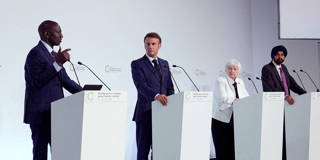For decades, rich countries have urged developing countries to shift away from fossil fuels while failing to heed their own advice or offer meaningful funding. Kenyan President William Ruto’s recent call to establish a new “global green bank” is the sort of thoughtful proposal that developed countries must seriously consider.
CAMBRIDGE – Speaking to the Financial Times at the June 22-23 Summit for a New Global Financing Pact in Paris, Kenyan President William Ruto called for the establishment of a “global green bank” that would assist developing countries in mitigating the effects of climate change without further exacerbating their already-unsustainable debt levels. This thoughtful and important proposal is one that rich countries must consider if they are serious about tackling climate change, fostering peace, and promoting prosperity in Africa and the rest of the developing world.

CAMBRIDGE – Speaking to the Financial Times at the June 22-23 Summit for a New Global Financing Pact in Paris, Kenyan President William Ruto called for the establishment of a “global green bank” that would assist developing countries in mitigating the effects of climate change without further exacerbating their already-unsustainable debt levels. This thoughtful and important proposal is one that rich countries must consider if they are serious about tackling climate change, fostering peace, and promoting prosperity in Africa and the rest of the developing world.